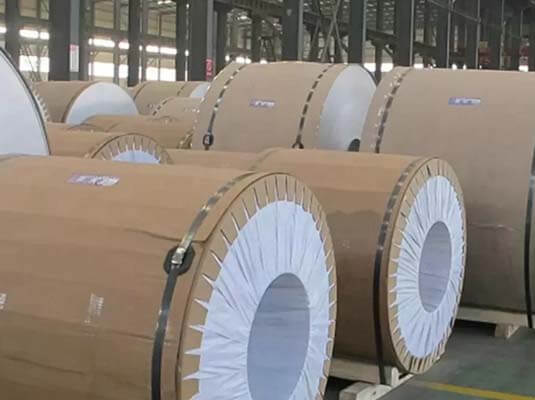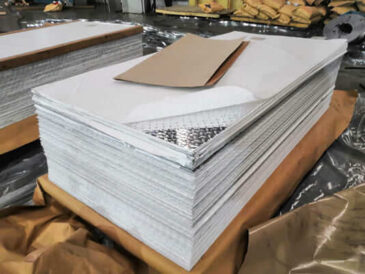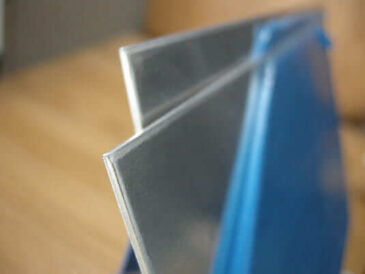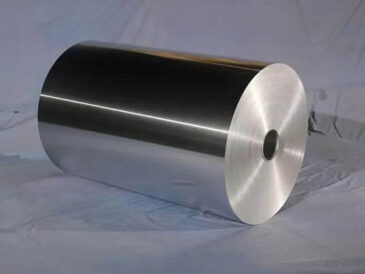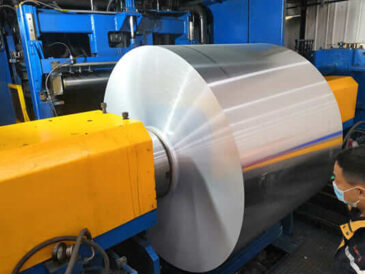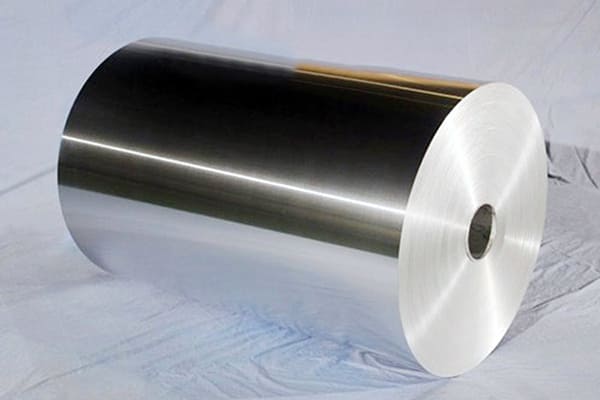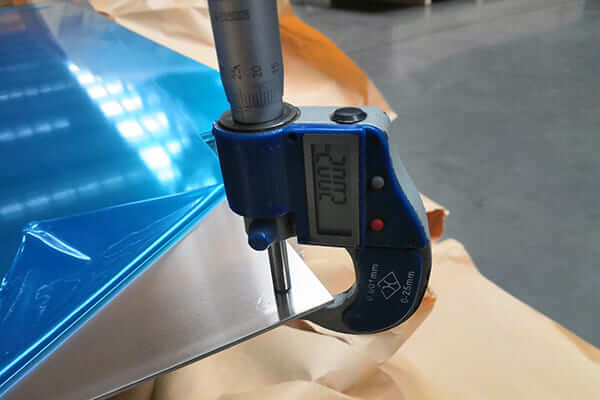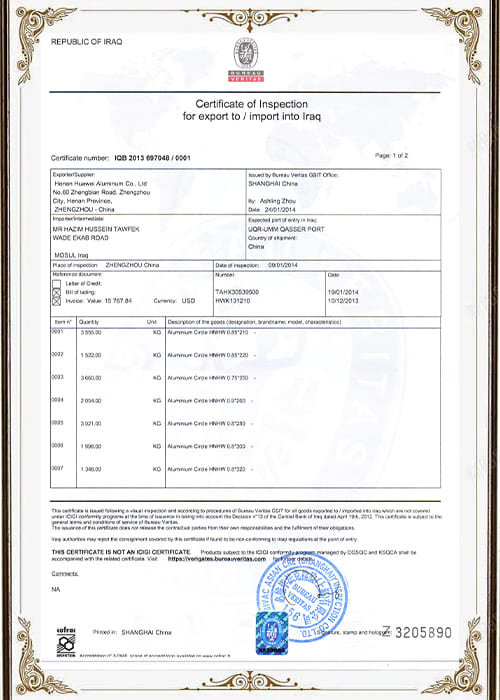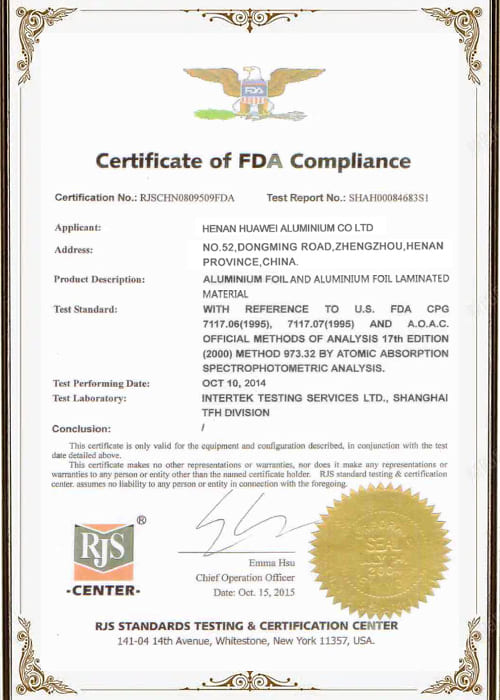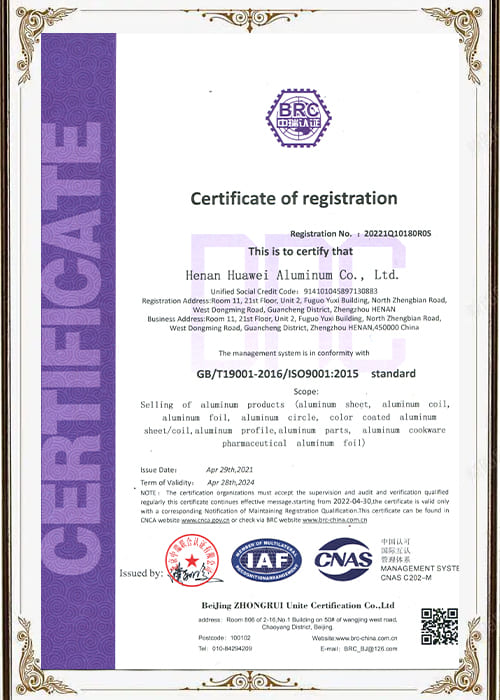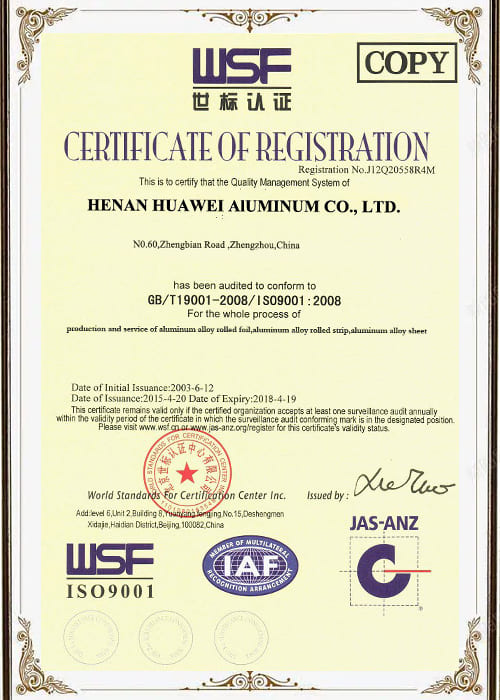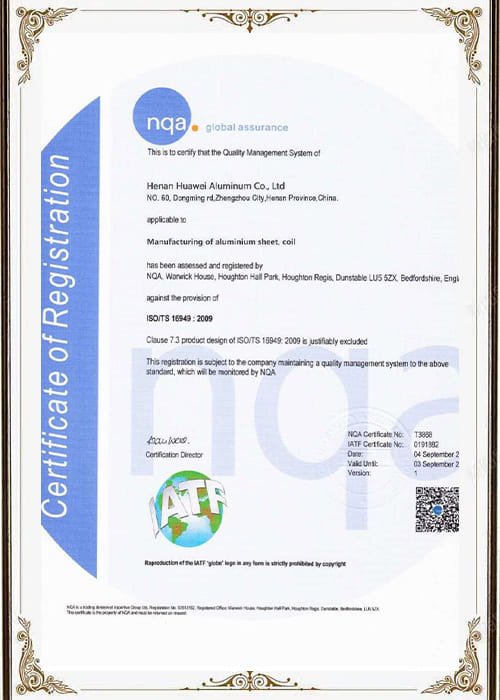7075 aluminum coil overview:
Welcome to Huawei Aluminum, your premier destination for purchasing top-quality 7075 aluminum coils. As a prominent manufacturer and wholesaler, we take pride in providing high performance aluminum solutions to meet the stringent requirements of aerospace and high stress applications.
7075 aluminum alloy is known for its excellent strength, high hardness and excellent stress corrosion resistance. At Huawei Aluminum, we specialize in producing high-quality 7075 aluminum coils, tailored to meet the demanding needs of industries where strength and performance are critical.
7075 is one of the strongest alloys with a good balance of properties required in aerospace applications for highly stressed parts.
Although the addition of chromium provides the 7075 aluminum sheet product with good resistance to stress corrosion cracking, corrosion resistance and processability are rated fair. Like Alloy 2024, Alloy 7075 is available in bare or clad form to provide further protection against corrosion.
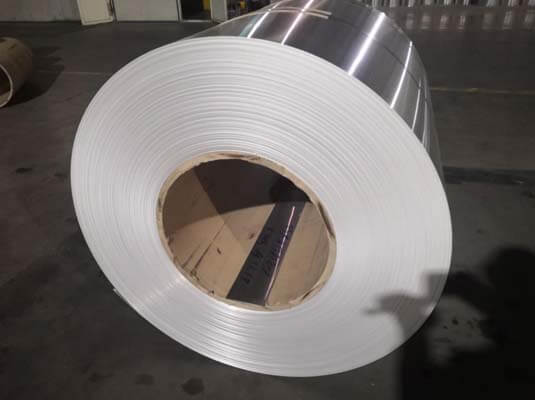
7075 Aluminum Coil
Characteristics of 7075 aluminum:
Let’s dive into the key properties that make 7075 aluminum coil the material of choice for aerospace and other high-stress applications:
- High strength: 7075 aluminum has one of the highest strength-to-weight ratios among aluminum alloys, making it ideal for applications where weight reduction is important.
- Hardness: Known for its exceptional hardness, 7075 aluminum provides superior wear resistance, helping it last longer in challenging environments.
- Corrosion Resistance: The alloy has good corrosion resistance, ensuring durability in various atmospheric conditions.
- Machinability: Despite its high strength, 7075 aluminum is still machinable, allowing for precision machining during the manufacturing process.
Chemical composition of 7075 aluminum coil:
| Element | Percentage By Weight |
| Zinc (Zn) | 5.1 – 6.1% |
| Magnesium (Mg) | 2.1 – 2.9% |
| Copper (Cu) | 1.2 – 2.0% |
| Iron (Fe) | 0 – 0.5% |
| Silicon (Si) | 0 – 0.4% |
| Manganese (Mn) | 0 – 0.3% |
| Chromium (Cr) | 0 – 0.3% |
| Aluminum (Al) | The Remainder |
7075 aluminum coil physical properties:
| Properties | Metric | Imperial |
|---|---|---|
| Tensile strength | 220 MPa | 31909 psi |
| Yield strength | 95 MPa | 13779 psi |
| Shear strength | 150 MPa | 21756 psi |
| Fatigue strength | 160 MPa | 23206 psi |
| Elastic modulus | 70-80 GPa | 10153-11603 ksi |
| Poisson’s ratio | 0.33 | 0.33 |
| Elongation at break | 17% | 17% |
| Hardness | 60 | 60 |
Applications of 7075 Aluminum Coil
7075 aluminum coil finds widespread use in industries where strength, toughness, and resistance to fatigue are critical. Some notable applications include:
- Aerospace: Used in the production of aircraft structures, fuselage components, and other critical parts.
- Defense: Employed in the manufacturing of missile parts and high-performance military equipment.
- Automotive: Utilized for the production of high-strength automotive components, such as chassis parts and suspension systems.
- High-Stress Applications: Suitable for applications subjected to high stress, such as heavy-duty machinery and equipment.
- Sports Equipment: Commonly used in the construction of high-performance sports equipment, including bicycle frames.

7075 aluminum coil is used in aircraft manufacturing
The difference between 7075 and 6061 alloys
The 7075 and 6061 aluminum alloys are both popular and widely used in various industrial applications, but they differ in terms of their composition, properties, and typical applications. Let’s explore the key differences between the two alloys:
Composition
6061 Aluminum Alloy:
- Major alloying elements: Aluminum, Magnesium, and Silicon.
- Other elements: Copper and small amounts of Chromium, Zinc, and Titanium.
- The nominal composition of 6061 alloy is approximately 97.9% aluminum, 1% magnesium, 0.6% silicon, 0.3% copper, and trace amounts of other elements.
7075 Aluminum Alloy:
- Major alloying elements: Aluminum, Zinc, and a small amount of Copper.
- Other elements: Magnesium, Chromium, and small amounts of other elements.
- The nominal composition of 7075 alloy is approximately 90.7% aluminum, 5.6% zinc, 2.5% copper, 1.6% magnesium, 0.2% chromium, and trace amounts of other elements.
Mechanical Properties
6061 Aluminum Alloy:
- Tensile Strength: 40,000 psi (276 MPa)
- Yield Strength: 35,000 psi (241 MPa)
- Elongation: 8%
7075 Aluminum Alloy:
- Tensile Strength: 83,000 psi (572 MPa)
- Yield Strength: 73,000 psi (503 MPa)
- Elongation: 11%
Hardness:
6061 Aluminum Alloy:
- Brinell Hardness: 95
7075 Aluminum Alloy:
- Brinell Hardness: 150
Heat Treatment:
6061 Aluminum Alloy:
- Can be easily heat-treated to increase strength.
7075 Aluminum Alloy:
- Generally supplied in the T6 temper (solution heat-treated and artificially aged), offering high strength.
Typical Applications:
6061 Aluminum Alloy:
- Commonly used in general fabrication, structural components, bicycle frames, automotive parts, and marine applications.
- Offers good corrosion resistance and weldability.
7075 Aluminum Alloy:
- Primarily used in aerospace applications, aircraft structures, missile components, high-performance automotive parts, and other high-stress applications.
- Known for its high strength-to-weight ratio and excellent fatigue resistance..
Casting production process and its introduction
The purpose of melting and casting is to produce alloys with satisfactory composition and high purity of melt, so as to create favorable conditions for casting alloys of various shapes.
Melting and casting process steps: batching --- feeding --- melting --- stirring after melting, slag removal --- pre-analysis sampling --- adding alloy to adjust the composition, stirring --- refining --- static Setting——Guide furnace casting.
Hot rolling production process and its introduction
- 1. Hot rolling generally refers to rolling above the metal recrystallization temperature;
- 2. During the hot rolling process, the metal has both hardening and softening processes. Due to the influence of deformation speed, as long as the recovery and recrystallization process is too late, there will be a certain work hardening;
- 3. The recrystallization of the metal after hot rolling is incomplete, that is, the coexistence of recrystallized structure and deformed structure;
- 4. Hot rolling can improve the processing performance of metals and alloys, reduce or eliminate casting defects.
- 1. The casting and rolling temperature is generally between 680°C and 700°C. The lower the better, the stable casting and rolling line usually stops once a month or more to re-stand. During the production process, it is necessary to strictly control the liquid level of the front tank to prevent low liquid level;
- 2. Lubrication uses C powder with incomplete combustion of gas for lubrication, which is also one of the reasons for the dirty surface of casting and rolling materials;
- 3. The production speed is generally between 1.5m/min-2.5m/min;
- 4. The surface quality of products produced by casting and rolling is generally relatively low, and generally cannot meet products with special physical and chemical performance requirements.
- 1. Cold rolling refers to the rolling production method below the recrystallization temperature;
- 2. There will be no dynamic recrystallization during the rolling process, and the temperature will rise to the recovery temperature at most, and the cold rolling will appear in a work hardening state, and the work hardening rate will be large;
- 3. The cold-rolled sheet and strip have high dimensional accuracy, good surface quality, uniform structure and performance, and products in various states can be obtained with heat treatment;
- 4. Cold rolling can roll out thin strips, but at the same time, it has the disadvantages of high energy consumption for deformation and many processing passes.
- 1. Finishing is a processing method to make the cold-rolled sheet meet the customer's requirements, or to facilitate the subsequent processing of the product;
- 2. The finishing equipment can correct the defects produced in the hot rolling and cold rolling production process, such as cracked edge, oily, poor plate shape, residual stress, etc. It needs to ensure that no other defects are brought into the production process;
- 3. There are various finishing equipments, mainly including cross-cutting, slitting, stretching and straightening, annealing furnace, slitter, etc.
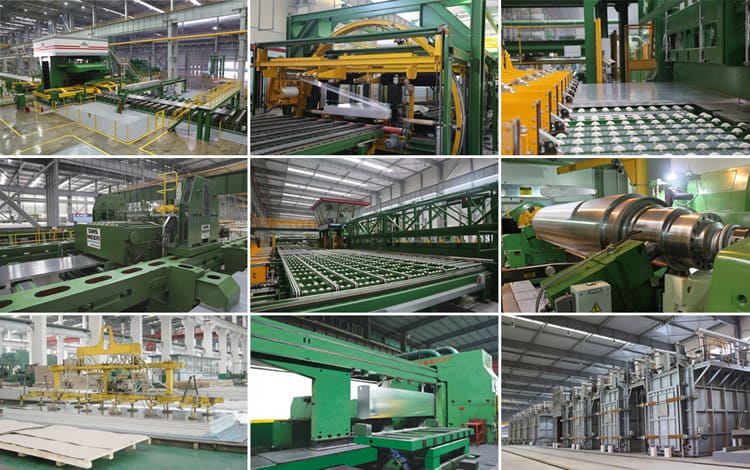
Casting and rolling process
Casting and rolling process: liquid metal, front box (liquid level control), casting and rolling machine (lubrication system, cooling water), shearing machine, coiling machine.
Cold rolling production process

Introduction to finishing production process
Aluminum alloy has the characteristics of low density, good mechanical properties, good processing performance, non-toxic, easy to recycle, excellent electrical conductivity, heat transfer and corrosion resistance, so it has a wide range of applications.
Aerospace: used to make aircraft skins, fuselage frames, girders, rotors, propellers, fuel tanks, wall panels and landing gear struts, as well as rocket forging rings, spacecraft wall panels, etc.
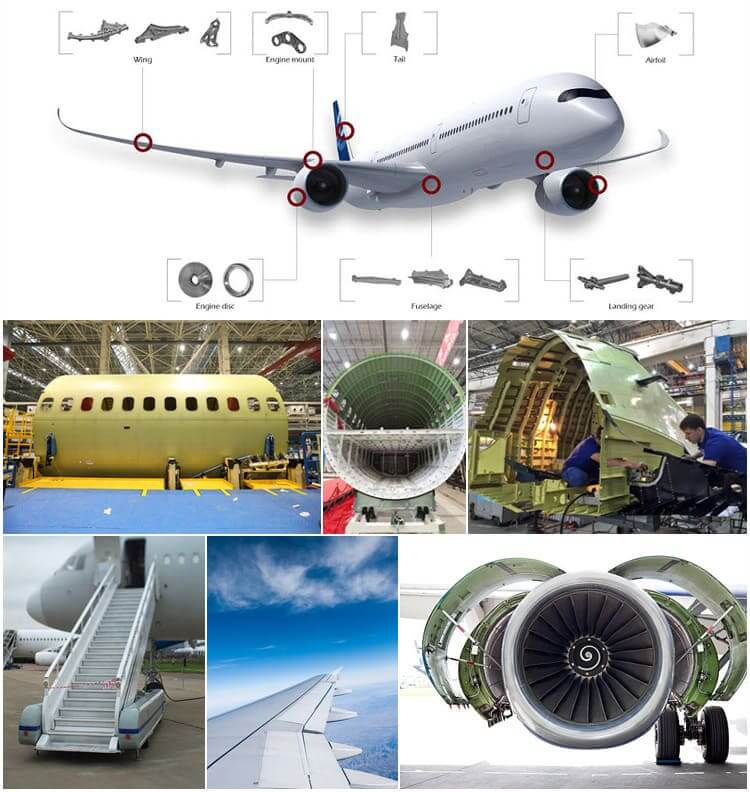
Aluminum alloy used for aerospace
Transportation: used for car body structure materials of automobiles, subway vehicles, railway passenger cars, high-speed passenger cars, doors and windows, shelves, automotive engine parts, air conditioners, radiators, body panels, wheels and ship materials.
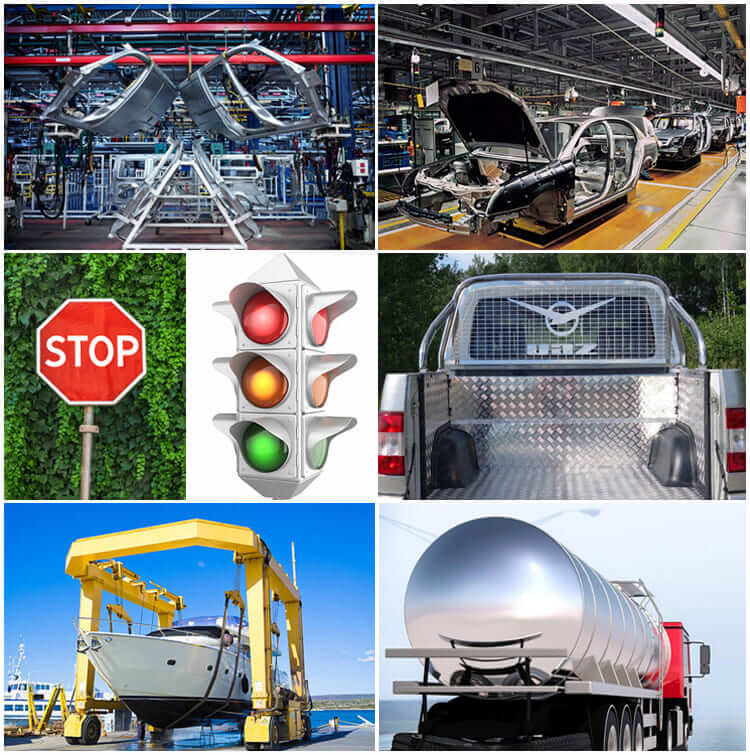
Traffic application
Packaging: All-aluminum pop cans are mainly used as metal packaging materials in the form of thin plates and foils, and are made into cans, lids, bottles, barrels, and packaging foils. Widely used in the packaging of beverages, food, cosmetics, medicines, cigarettes, industrial products, medicines, etc.
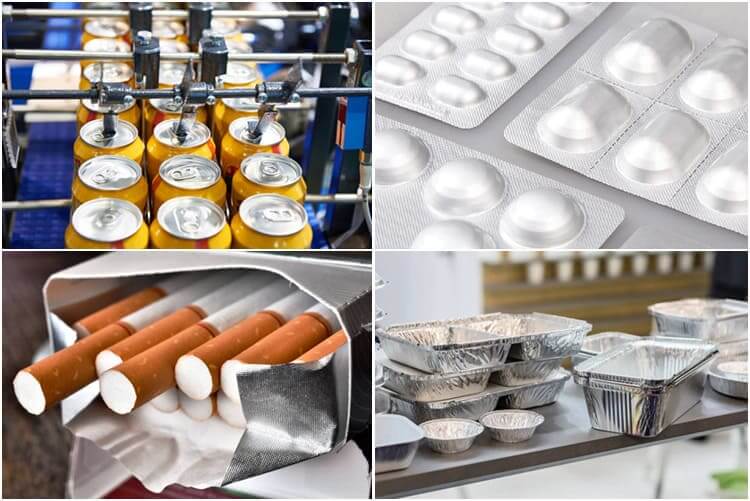
Packaging application
Printing: Mainly used to make PS plates, aluminum-based PS plates are a new type of material in the printing industry, used for automatic plate making and printing.
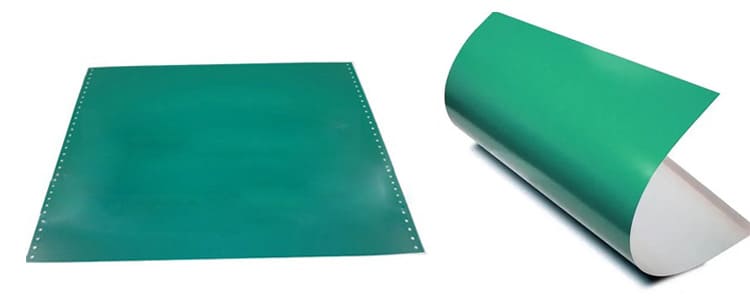
PS printing
Architectural decoration: aluminum alloy is widely used in building structures, doors and windows, suspended ceilings, decorative surfaces, etc. due to its good corrosion resistance, sufficient strength, excellent process performance and welding performance.
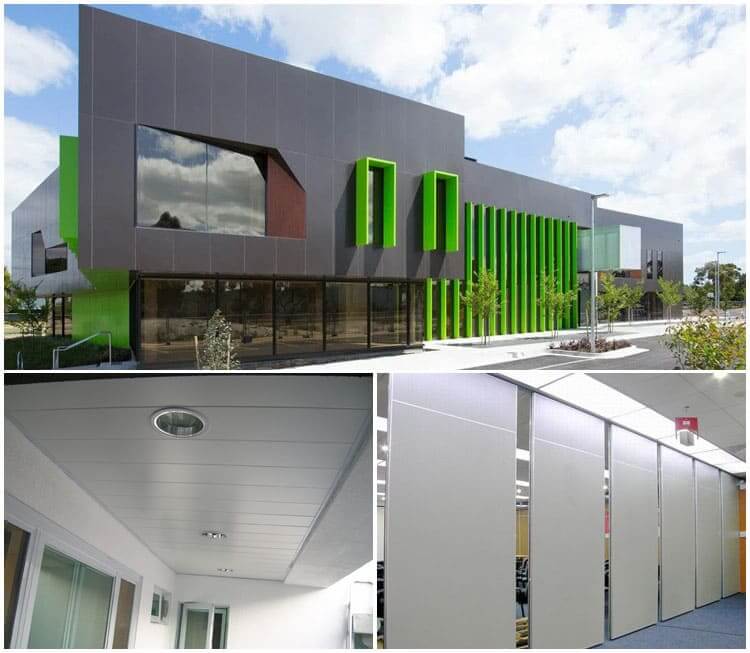
Aluminum alloy construction application
Electronic products: computers, mobile phones, refrigerator shells, radiators, etc.
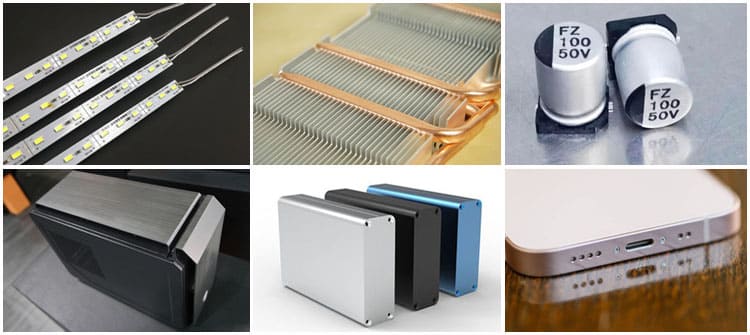
Electronic product application
Kitchen supplies: aluminum pots, aluminum basins, rice cooker liners, household aluminum foil, etc.
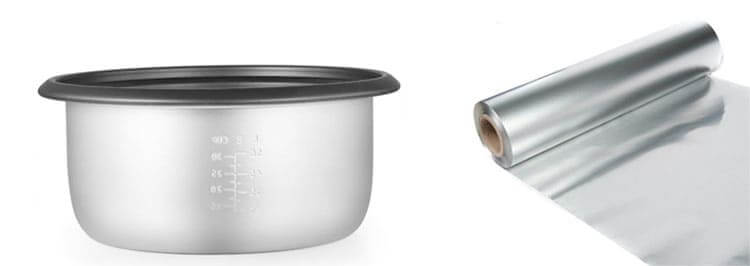
Kitchen application
Packaging Of Aluminum Sheet/Coil
Every detail of packaging is where we pursue perfect service. Our packaging process as a whole is as follows:
Lamination: clear film, blue film, micro-mucosal, high-mucosal, laser cutting film (2 brands, Novacell and Polyphem);
Protection: paper corner protectors, anti-pressure pads;
drying: desiccant;
Tray: fumigated harmless wooden tray, reusable iron tray;
Packing: Tic-tac-toe steel belt, or PVC packing belt;
Material Quality: Completely free from defects such as white rust, oil spots, rolling marks, edge damage, bends, dents, holes, break lines, scratches, etc., no coil set.
Port: Qingdao or other ports in China.
Lead time: 15-45 days.
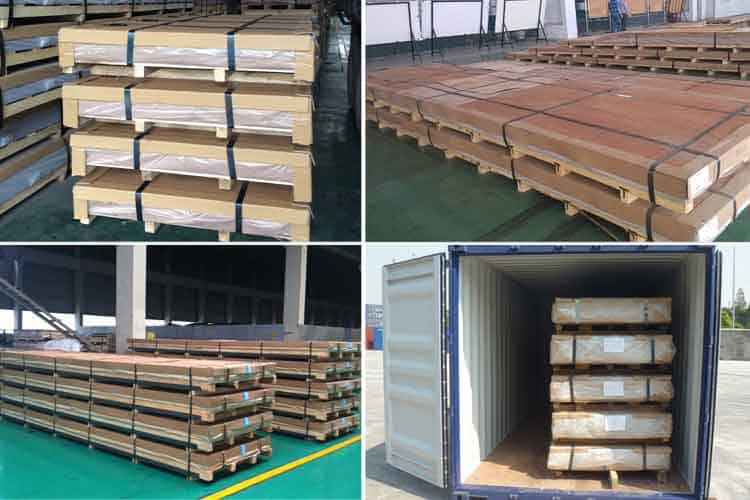
Aluminum sheet/plate packaging process
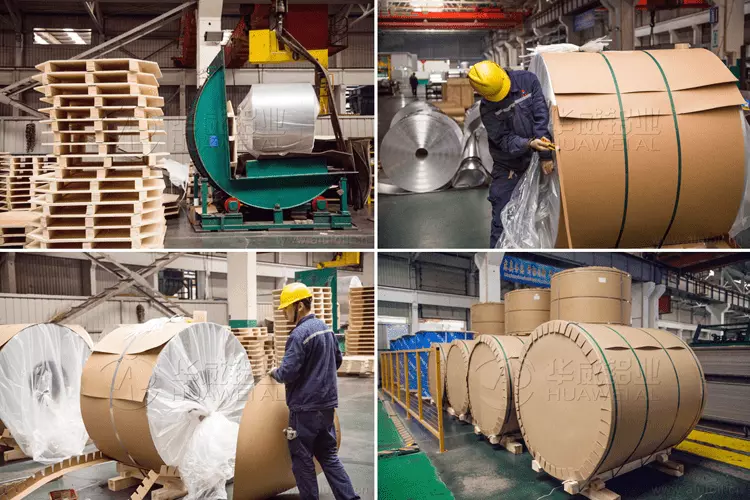
Aluminum coil packaging process
F: Are you a manufacturer or a trader?
Q: We are a manufacturer, our factory is at No.3 Weier Road, Industrial Zone, Gongyi, Henan, China.
F: What is the MOQ for ordering the product?
Q: Our MOQ is 5 tons, and some special products will have a minimum order quantity of 1 or 2 tons.
F: How long is your lead time?
Q: Generally our lead time is about 30 days.
F: Do your products have quality assurance?
Q: Yes, if there is a quality problem with our products, we will compensate the customer until they are satisfied.
Related Products
Latest Blogs
6061 vs 7075 aluminum
"6061" and "7075" are two common aluminum alloy grades, which are widely used in many industrial fields, especially in aviation, aerospace, transportation and structural manufacturing.
Aluminum Foil Used in Air Fryers
Aluminum foil is widely used in daily life, mainly due to its light weight, good ductility, moderate price, and excellent heat conduction and light-shielding properties.
Reasons why the surface of honeycomb aluminum foil cannot be bonded with the adhesive
Aluminum honeycomb panels have good performance in use. They have good strength and good impact resistance. They can be well designed in use. Therefore, they are widely used at present.
Introduction hardness of 1000-8000 series aluminum alloys
1000-8000 series basically covers all aluminum alloy series products. Different series of products have different performance and hardness.

